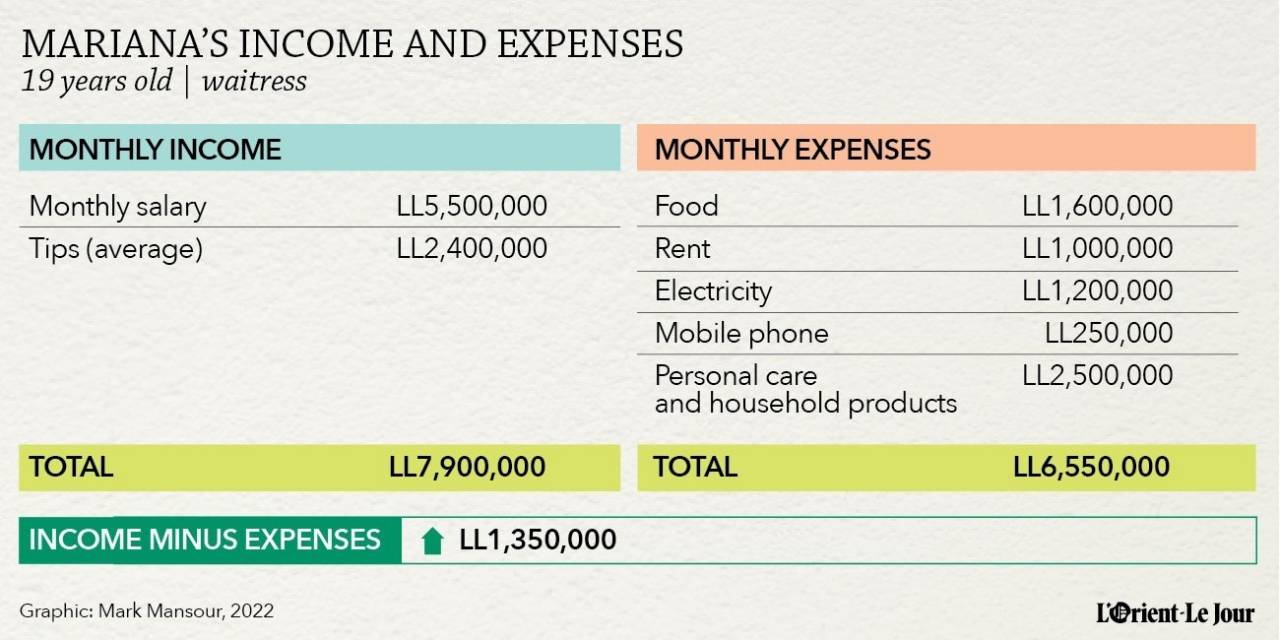
(Credit: Mark Mansour)
Originally from Batroun in North Lebanon, Mariana moved in June to the heart of the Lebanese capital —the neighborhood of Achrafieh, not far from the café where she works as a full time waitress.
“My fixed schedule is from 11 a.m. to 8 p.m., six days a week, and my monthly salary is around LL5.5 million," she says. This income, equivalent to $171.9 at the market rate of LL32,000, varies due to the five-day weeks Mariana takes once every three weeks to be with her family in Batroun, as well as fluctuations in her tips and overtime. She has been accumulating these “extras” lately to save money before the start of the university year in September, when she may have to reduce her work schedule due to classes.
Mariana has chosen to be independent in Beirut. But this choice has a cost, especially in these times of crisis.
"My monthly rent is LL1 million," she says, adding that she is "lucky" because her landlady takes care of the internet subscription, electricity and water. The cost of the generator, on the other hand, is Mariana's responsibility, but she doesn't stay at home much and "only uses the fridge." So, to avoid paying for five amperes that would be useless to her, the young woman asked the owner of the generator to provide her with only half of it for LL1.2 million per month.
Unfortunately, "the fridge is giving up the ghost, so I avoid shopping.” So Mariana gets meals delivered for "about LL400,000 a week," she estimates. That's not enough money to feed herself, but she covers it with tips, which can sometimes reach LL600,000 a week.
"Most of our clients are foreigners or 'dollarized' Lebanese.” They are a regular clientele in this neighborhood, where Mariana also does everything on foot. "I don't spend anything on transportation," she says. When she wants to go to Batroun, her father comes to pick her up. There, Mariana fills up her tank.
"Everything is much cheaper than in Beirut. I buy household and hygiene products there. I easily save LL500,000 compared to what the same purchases would cost me in Beirut. She estimates her current consumption expenses at about LL2.5 million per month.
Finally, for her phone, Mariana spends about LL250,000, according to the new telecom tariffs based on the dollar to lira rate of the Banque du Liban platform, Sayrafa.

Carpe diem
Today, Mariana's goal is to save LL1 million a month.
“I’d really like to start shopping again,” she says. “It will be soon,” she hopes. In the meantime, the future student knows what’s coming in September: university fees, increased internet and generator subscriptions to study, and the cost of transportation to get to university.
Mariana is not yet 20 years old. It will be her birthday in a few months. If all goes well, she will be studying Italian literature at the Lebanese University.
“I don’t intend to go to Italy. I chose this subject out of passion rather than the idea of a specific outlet. I don’t project myself into the future.” This “come what may” that the young girl repeats is certainly the reflection of a personal philosophy, based on carpe diem and family reasons, but it also serves as a mirror to a Lebanese context that lends itself less and less to considering the future in the long term.
This article was originally published in French in L'Orient-Le Jour.
Correction: A previous version of this article said Mariana's goal is to save LL100,000 a month. Her goal is to save LL1 million a month.
